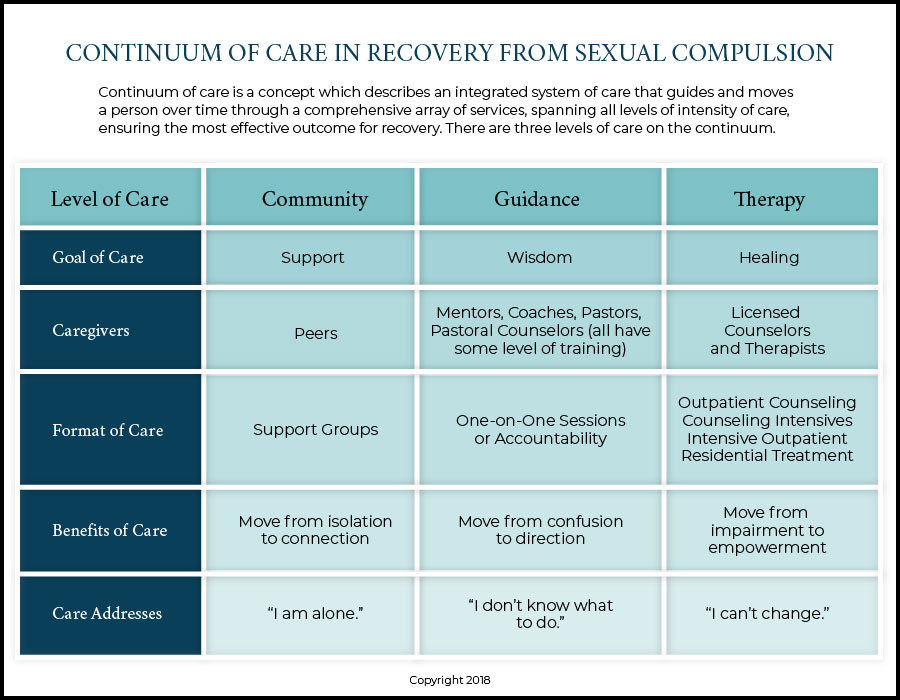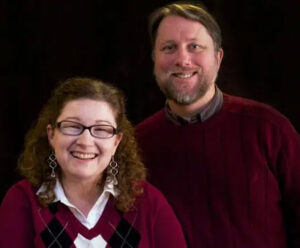By Troy and Melissa Haas
If you struggle with using your sexuality in unhealthy and sinful ways, there is hope for healing and recovery. We know that looking for help for addictive or problematic sexual behaviors can be a confusing and overwhelming endeavor. And if you are married, you also want to know how to help your spouse recover and heal. Here is some important information for you to understand as you begin your recovery journey.
Recovery is a process, with different elements being managed at the same time.
Treatment for sex addiction happens in an integrated continuum of care through a guided process designed to help you reach the best outcome for your recovery. There are three different levels of care you will need as a part of your recovery program. Each level of care targets different goals of recovery and involves different caregivers.
It might be helpful to think of it this way. If you broke your leg in multiple places, you would need a continuum of care and several different caregivers to help you heal: a surgeon to put everything back into place, a physical therapist to help your leg muscles work properly again, and friends to support you practically and emotionally.
Take a moment to look at the important graphic below.

Notice, that there are three levels of care, each accomplishing something different and important.
Community—You will not be alone in the process. We don’t heal well on our own. Peers and support groups are critical in providing much-needed connection and support.
Guidance—You will need one-on-one advice and direction from others who understand. A relationship with a sponsor, mentor, pastor or coach provides essential wisdom and accountability on your healing journey.
Therapy—You will need professional help to change. Licensed counselors and therapists offer the type of specific counseling and treatment plan you need to move toward healing.
Every person in recovery from sexual addiction will need all three levels of care. That means that you need to find a support group in your area, a sponsor or mentor, and a therapist.
Let’s look at how to do that next.
Finding Each Type of Help
You will be pulling together a team of caregivers from each level of care. It often helps to reach out to someone (a pastor, a therapist, a friend you trust) for help in finding the care you need.
Community: The national support groups we recommend are Walking Free (https://walkingfree.us/), Pure Desire (https://puredesire.org/), and Samson Society (https://samsonsociety.com/)
These groups are built around a Christ-centered curriculum and have groups around the country. Some areas have local sexual integrity ministries, so be sure to check for those opportunities near you. You may also find help at Celebrate Recovery groups, although they are not specific to sexual addiction. For women struggling with pornography addiction, www.sherecovery.com offers virtual women-only groups. SA (Sexaholics Anonymous), SSA (Sex Addicts Anonymous, and SLA (Sex and Love Addicts Anonymous) are non-Christian options which also offer support for people in recovery from sex addiction.
Guidance: Once you become involved in a support group, you will either be given or must seek out a sponsor or mentor to help you navigate the challenges of recovery. Several ministries offer online coaching–www.bravehearts.org, www.bebroken.org, and puredesire.org. A pastor or personal coach, or mentor might also play a role. The key is to develop a one-on-one relationship that provides direction and creates accountability.
Therapy: An essential step is determining what level and type of professional care you need to be successful. A few key points: Individual therapy is valuable in assessing the level of care needed. It will also be important in addressing issues underlying the sexual behavior.
We recommend finding a Certified Sexual Addiction Therapist (CSAT) who can administer a psychological assessment called the Sexual Dependency Inventory (SDI) to help you determine what level of professional care you need. You can find a directory of CSAT therapists here (https://iitap.com/search/custom.asp?id=5357). In addition, Christian Sex Addiction Specialists International (https://www.c-sasi.org/) has a directory of many Christian CSATs.
Sometimes people struggling with addiction need more help than weekly counseling. They may benefit from a counseling intensive, an intensive outpatient program, or a residential treatment program. A counseling intensive is an intensive counseling experience lasting from 3 days to 14 days that gives a person in recovery focused time away to work on underlying issues. There are many intensives out there, but the following have been involved in this area of ministry for many years: Faithful and True–www.faithfulandtrue.com, Bethesda Workshops–www.bethesdaworkshops.org, and Restoring the Soul—www.restoringthesoul.com.
Your therapist may recommend that you need the highest level of care–residential treatment–in order to be successful in your recovery. Most residential treatment centers have 30 to 90 day programs. For men, we recommend HopeQuest–www.hopequestgroup.org, the only Christ-centered and clinically effective residential program in the US. Two secular treatment centers that are excellent are Pine Grove (www.pinegrovetreatment.com) and The Meadows (www.gentlepathmeadows.com).
Help for Your Spouse
If you are married, your spouse will also need all three levels of care to help her heal from betrayal trauma. National support groups for wives built around a curriculum are Journey (http://journeyforwives.us/) and Betrayal and Beyond (https://puredesire.org/). In some areas, local ministries have groups for spouses, so be sure to look into options near you. (S-Anon groups are non-Christian but may provide much needed community.) Spouses should also look for CSAT therapists (https://iitap.com/search/custom.asp?id=5357) who specialize in working with spouses and betrayal trauma. All of the ministries that offer intensives for men, also offer intensives for spouses or some form of partner support.
Recommended Christian Books/Resources
Below you will find recommended Christian resources that will help you and your spouse on your journey of healing.
For Men:
- Breaking Free by Russell Willingham
- Healing the Wounds of Sexual Addiction by Mark Laaser
- Unwanted by Jay Strenger
- Building for Freedom Workbook by Troy Haas
- Quest for Authenticity Workbook by Troy Haas
- Overcoming Obstacles on the Journey Workbook by Troy Haas
- Seven Pillars of Freedom Workbook by Pure Desire Ministries
- Conquer Series by Pure Desire Ministries
- Covenant Eyes Accountability Software (www.covenanteyes.com)
For Women:
- No Stones by Marnie Ferree
- LIFE Guide for Women by Marnie Ferree
- Unraveled Workbook by Pure Desire Ministries
- Dirty Girls Come Clean by Crystal Renaud Day
For Spouses:
- Intimate Deception by Sherri Keffer
- Shattered Vows by Debra Laaser
- The Journey Workbook by Melissa Haas
- Continuing the Journey workbook by Melissa Haas
- LIFE Guide for Spouses by Melissa Haas
- Betrayal and Beyond Workbook by Pure Desire Ministries
For Couples:
- Created for Connection by Sue Johnson
- Seven Desires by Mark & Debbie Laaser
- Sex, God, and Chaos by Roan & Eva Hunter
- Connected Workbook by Pure Desire Ministries
A Final Encouragement
A journey toward healing might seem overwhelming and impossible. Having walked the road of recovery ourselves, we can promise you that it is worth it. Take the first step by being honest with someone you trust. Then take one step at a time, one day at time, trusting the caregivers in your live to lead you toward healing and freedom. And remember, God is for you and will be faithful to complete the good work He has started.
 Troy Haas, MDiv, CADC II, CSAT, CMAT, PSAP-S
Troy Haas, MDiv, CADC II, CSAT, CMAT, PSAP-S
Melissa Haas, MAMFT, LPC, CSAT, CMAT
Troy is the co-founder and CEO of the HopeQuest Ministry Group and has over 30 years of ministry experience, including six years as an IMB missionary in Kenya and 15 years as Director of Restoration Ministries at First Baptist Church of Woodstock. Troy’s personal struggle with addiction and own journey of recovery have enabled him to minister to others with authenticity and grace, providing hope that freedom is possible.
Melissa is the spouse-supporting therapist for the Trek Residential Treatment program at HopeQuest, as well as a counselor at FBC Woodstock’s counseling center. Passionate about spiritual community, healthy marriages, and intimacy with God, Melissa regularly facilitates small groups and teaches and speaks on these topics in order to help the Body of Christ grow relationally with God and each other.
Melissa and Troy have been married for 31 years and recently began their 22nd year in recovery. They have dedicated their lives to encouraging, enabling, and equipping the body of Christ to live out Galatians 6:1—Brothers, if someone is caught in a sin, you who are spiritual should restore him gently.
